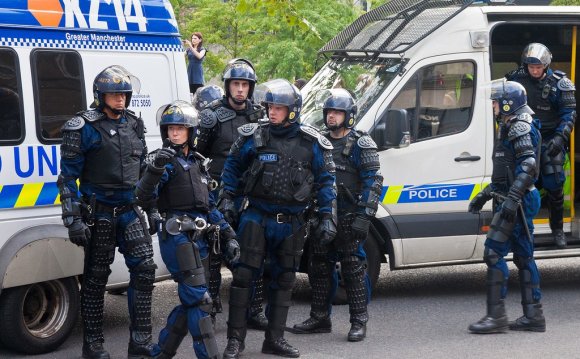
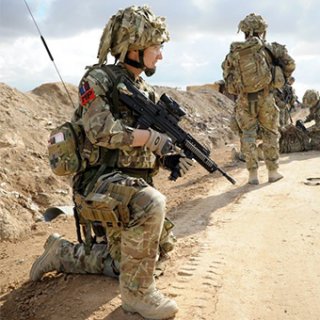
My Role
‘RAF Police Officers are not responsible solely for policing; in fact, that’s only a small part of the job. Our main role is to provide security – of assets, people and information. We also protect classified data – computer security in particular is a rapidly expanding and challenging field. We also deal with any offences involving policemen or officers.
My first tour was as Drug Abuse Prevention Officer for the north of England. I also got involved in investigations and liaising with the civilian police, seeing how they went about their work. On my next tour, I worked in a team that briefed station commanders, executives and the RAF Police on the effects of human rights legislation – how it impacts on surveillance and things like that.
It was quite a challenge, having to tell people with 30 years’ experience the way it had to be done. It was also very rewarding, because you could see their minds changing to “She’s done her research and she’s the specialist on this.'
My Day
‘As an RAF Police Officer on a station, you are a manager of the Police Flight, so you’re not as hands on as the specialist officers. We’re responsible for ensuring the welfare of the Flight, and that it’s being run properly.
In addition, we’re responsible for security education – making people aware of any threats and ensuring, for example, that no sensitive information is divulged over the telephone.’
Jackie, RAF Police Officer
Full Time
Regular
Initial Training
Like all our officers, you will begin your RAF career with Initial Officer Training (IOT) at the RAF College Cranwell in Lincolnshire. You will follow a challenging 30-week course designed to develop your leadership and management skills. The course includes fitness development, military training and academic study as well as practical outdoor leadership challenges.
Specialist Training
After IOT you will complete the 22-week RAF Police Officers’ Course (RAFPOC) at the Defence School of Policing and Guarding, Southwick Park near Portsmouth, some of which is done with Royal Military Police and Royal Navy Police colleagues.
The RAFPOC will continue to build upon your leadership and management skills whilst covering aspects of criminal law, investigations and security (which will also incorporate training in counter intelligence and security risk management). You will also be given additional training in military skills and the use of force to enable you to effectively fulfil the wide variety of operational roles conducted by the RAF Police.
Once specialist training has been completed, you will then be ready to undertake your first tour.
Foundation Tour
For your first tour after training, you will probably be posted to a unit where you will be responsible for the security of critical RAF assets and the policing of Service personnel. Although you will lead a team of RAF Police personnel and security specialists from the outset, you will be supervised and supported by a RAF Police Squadron Commander.
Your Career Prospects
You will join the RAF on an Initial Commission of 12 years and may be selected to serve on a pension earning commission of 20 years service or age 40, whichever is the later, during this time. Promotion to the rank of Flight Lieutenant is on a time served/satisfactory service basis after 3½ years from completing IOT. Further promotion to Squadron Leader and above is by competitive selection.
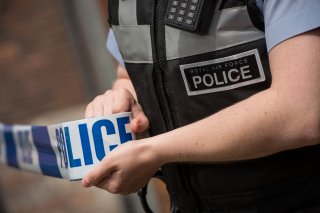 Ongoing Development
Ongoing Development
RAF Police Officers can expect to be employed on a wide range of operational and staff duties and may be selected to undertake further training in fields such as the investigation of serious crime, counter intelligence or cyber security. As a RAF Police Officer, you will develop skills and gain experience similar to those of a senior civilian police officer, corporate security risk manager and information systems security manager. There will be the opportunity to attain professional qualifications that are recognised by civilian agencies and employers.
Spare Time
Reserve
Reserve Officer Initial Training
After basic training, recruits go on to Reserve Officer Initial Training during their second year. This combines distance learning with residential weekends at the prestigious RAF College Cranwell in Lincolnshire. It also includes a two-week residential phase at Cranwell where Reserves mix with Regular Officers on their initial training. During this period you will gain the skills and knowledge to command and lead in military roles and beyond.
Job requirements
Qualifications:
You will need a minimum of 5 GCSEs (or acceptable equivalents): at a minimum of grade C, including English Language and Mathematics or 5 Scottish National Equivalent (SNE) grades at a minimum of grade 5, including English Language and Mathematics.
In addition, you need at least 2 A2 Levels/3 Highers at grade C or above (excluding General Studies or Critical Thinking) which must total a minimum of 160 UCAS points. Alternatively, if you hold a UK degree at grade 2:2 or higher (or acceptable alternative) you only need Mathematics and English Language GCSEs at a minimum of grade C or Mathematics and English Language (SNE) at a minimum of grade 5.
You must also have a full UK driving licence.
Age:
- 21-36 (Civilian candidates must enter IOT before their 37th birthday)
- Upper age limit of 44 for Internal Commissioning Scheme
RAF Requirements
*When submitting your application choose 'Provost Officer' as your role choice.*
To join the RAF you will also need to meet fitness, health, nationality, residency, and other criteria detailed below.
2 A-levels or 3 Highers or equivalent, plus 5 GCSE/SCEs at Grade C/2 minimum or equivalent, including English language and maths.
Only qualified ex-military personnel, are currently eligible for this role.
The RAF are currently only recruiting suitably qualified ex-military officers with experience within this role.
INTERESTING VIDEO
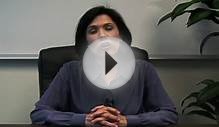

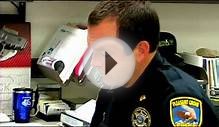

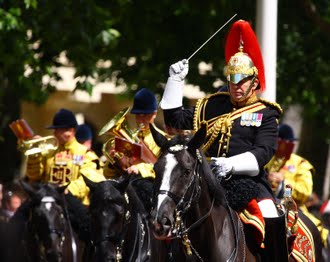 This is the horse-mounted element of the Household Cavalry of the Household Division of the Sovereign of the United Kingdom. The Life Guards and the Blues and Royals each provide a squadron, there is a Headquarters Squadron, and a Household Cavalry Training Wing.
This is the horse-mounted element of the Household Cavalry of the Household Division of the Sovereign of the United Kingdom. The Life Guards and the Blues and Royals each provide a squadron, there is a Headquarters Squadron, and a Household Cavalry Training Wing.
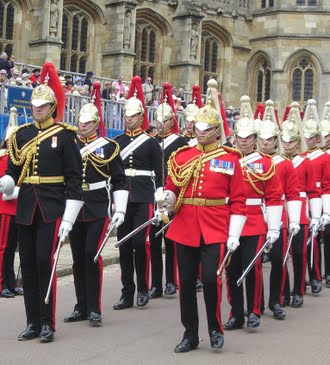 The term Household Cavalry is used across the Commonwealth to describe the cavalry of the Household Divisions, a country’s most elite or historically senior military groupings or those military groupings that provide functions associated directly with the Head of...
The term Household Cavalry is used across the Commonwealth to describe the cavalry of the Household Divisions, a country’s most elite or historically senior military groupings or those military groupings that provide functions associated directly with the Head of...








